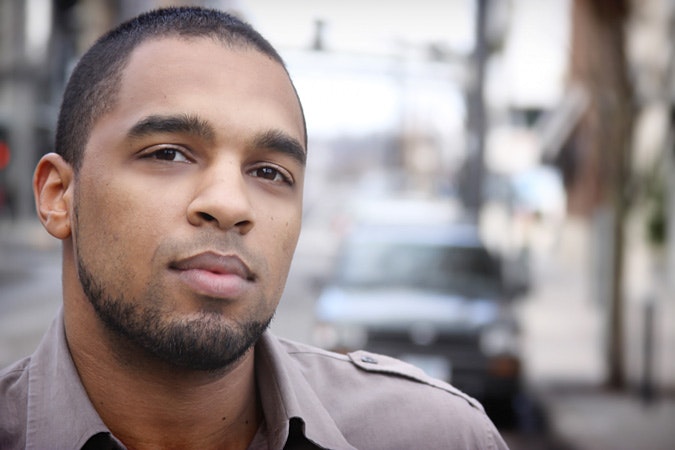In Praise of Black Fathers
By Jordan Thierry

Six years ago, on a return flight from Boston to DC after visiting a friend at Harvard, I sat in my window seat reflecting on how both my friend and I had made it all the way out to the East Coast from our hometown of Portland, Oregon. I was amazed that she was now making her mark in the Ivy League, and I was doing the same at “the Mecca,” Howard University.
I realized that if it weren’t for my father, I would not have made it out of high school, let alone college. I compared my situation to those of my other black friends back home, and found one common denominator in those who stayed on the right path: an involved father. By the time the plane landed and I was on my way home, I knew that my next film would address this issue, and it would be called The Black Fatherhood Project. What I didn’t know was that it would take me over five years to complete it.
As I began research for the film, I knew that it would have value because there were very few resources available on the topic, outside of articles that remained largely within academic circles. Motivated by this, I wasted no time and spent the next year interviewing black fathers about the challenges, rewards, successes, and importance of black fatherhood. While my conversations with these men were insightful, they left me with more questions than answers.
Is my purpose in making the film to counter mainstream media portrayal of black fathers as “deadbeats”? Would that improve the current circumstances of fatherless black children? How can I counter the “deadbeat” stereotype in defense of fathers like my own, while confronting a real problem of fatherlessness in the black community? How can I make a “call to action” without perpetuating stereotypes and being perceived as attacking my fellow black men?
I stopped production and grappled with these questions for almost two years. Over 18 months had passed before I decided what to do next—I needed to provide context for the conversations I had with these fathers, I needed to delve deep into history to better understand how we got into this situation in the first place.
I did that, and the end product is a documentary film that looks at the experience of the black father starting in precolonial Africa through slavery, the great migration, the civil rights movement, and the crack epidemic to present day. It outlines the social, political, and economic factors that have impacted the black family and undermined its existence. It profiles the sacrifices black people have made for their families, and offers solutions on how communities can come together to ensure that the power of a father’s love is not lost on America’s black children.
These solutions can be summarized in three words: Love, Responsibility, and Equity. Love is the basis for any parent-child relationship, and that love should be shown not only through verbal communication and affection, but also with action. The time a father spends with his children, his reliability and consistency, convey the love that children need from him.
Responsibility includes the fundamental duties of a parent as well as the responsibility of other men to model and look after the children in their community. We often hear stories from our elders about how their neighbors and teachers had an equal hand in disciplining them when they “cut-up” at school or church. We have to find a way to rebuild this sense of shared responsibility in the black community if we truly want our young people to thrive.
Lastly, a major factor of why so many black children are growing up fatherless is due to the lack of equity that exists for black men in America. We are not afforded the resources and opportunities we need to be successful as are other people. Major policy shifts must be made to address this inequity, so that black fathers are not overly represented in our prisons, and underrepresented in our homes.
To connect the film to these solutions, the Black Fatherhood Project nonprofit organization was created. In the next 12 months, we will be evaluating how the film can best be used to support the work of advocacy, social service, education, and philanthropic organizations, and creating a toolkit to accompany it.
The ultimate goal, however, is to further strengthen the amazing work that is happening in the black father movement, advocate for increased resources for our communities, and inspire people to step up in their roles as fathers, mothers, mentors, and activists. Doing so, we can restore possibilities for our children, so that their advancement through higher education institutions, like the Harvards and Howards of the world, become the norm and not the exception.
Jordan Thierry is founder and director of The Black Fatherhood Project, an Open Society Foundations grantee.